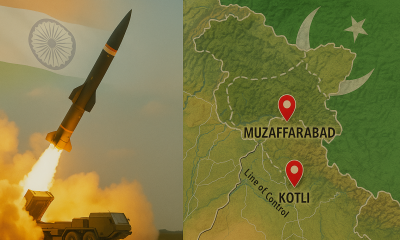Top Stories
Was the India-Pakistan War Pre-Planned? U.S. Economist Suggests China’s Role

A shocking revelation has emerged suggesting that the recent India-Pakistan conflict, triggered by the Poonch attack, might have been pre-planned, with a U.S. economist pointing to China’s involvement in escalating tensions.
The India-Pakistan war, which intensified after the Poonch attack on April 20, 2025, may have roots in the U.S.-China trade war, according to a U.S. economist. The shift of major manufacturing facilities from China to India, prompted by trade tensions, could have motivated China to support Pakistan, aiming to destabilise India and deter investment, thus raising questions about the conflict’s origins.
Unraveling the Chronology
The Poonch attack, carried out by Pakistan-backed terror groups, marked the beginning of heightened tensions between India and Pakistan. However, events leading up to it suggest a deeper geopolitical strategy. The U.S.-China trade war, characterised by tariffs and economic manoeuvring, saw Chinese vendors publicly boasting about U.S. brands sourcing from them, prompting American companies to reconsider their manufacturing bases.
-
Manufacturing Shift: Companies like Apple, Samsung, Dell, HP, and Tesla decided to move their manufacturing from China to India, threatening China’s economic dominance. This shift was part of a broader strategy to reduce reliance on China, as reported by various economic analyses.
-
China-Pakistan Support: As mentioned in recent discussions, a U.S. economist’s statement suggests that China may have supported Pakistan to incite conflict with India. The logic? No investor or business would risk entering a war-torn region, thus stalling India’s economic rise and protecting China’s interests.
-
Poonch Attack Trigger: The April 20 attack in Poonch, Jammu, is seen as the flashpoint, but the economist’s theory implies it was part of a larger plan to destabilise India, especially as manufacturing facilities were being relocated.
This theory, while speculative, aligns with the broader context of China-Pakistan relations and their “all-weather” strategic partnership. The idea that China could leverage Pakistan to counter India’s economic growth is not new, but the timing of the conflict raises eyebrows.
Implications and Reactions
The economist’s statement has sparked debate. While some dismiss it as a conspiracy, others see a plausible connection given the geopolitical stakes. India and Pakistan’s ongoing conflict, exacerbated by the Poonch attack, has indeed deterred foreign investment, aligning with the economist’s prediction.
-
India-Pakistan Tensions: The war has led to significant casualties, particularly in Poonch district, with recent shelling killing civilians and displacing families, as covered by NDTV.
-
Global Reaction: The international community, including the U.S., has called for de-escalation, but the underlying economic motives add a layer of complexity to the conflict.
As India-Pakistan war news continues to unfold, the question remains: Was this conflict pre-planned? The economist’s theory, while controversial, invites a reevaluation of the events leading up to the Poonch attack and the broader India-Pakistan-China triangle.









